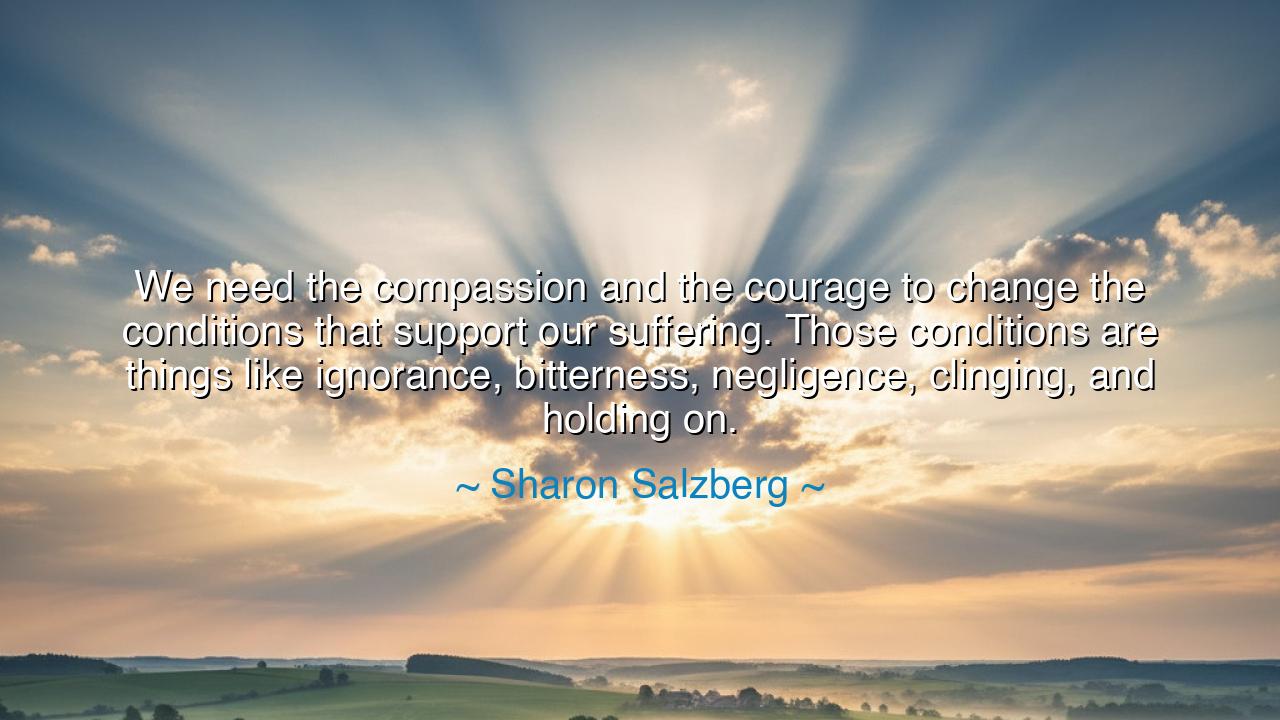
We need the compassion and the courage to change the conditions
We need the compassion and the courage to change the conditions that support our suffering. Those conditions are things like ignorance, bitterness, negligence, clinging, and holding on.






The teacher of mindfulness and compassion, Sharon Salzberg, once spoke these words of luminous truth: “We need the compassion and the courage to change the conditions that support our suffering. Those conditions are things like ignorance, bitterness, negligence, clinging, and holding on.” In these few lines, she names not the outer enemies of life, but the inner ones—the unseen chains that bind the human heart. She calls us not merely to endure suffering, but to transform it, to rise above it through the twin powers of compassion and courage, those sacred forces that cleanse the soul and make it whole again.
To understand her teaching, one must first see that suffering is not born from fate alone, but from the conditions that nourish it within us. Like weeds that thrive in neglected soil, pain grows in the darkness of ignorance, in the poison of bitterness, in the laziness of negligence, and in the tight fist of clinging—the refusal to let go of what must pass. We build our own prisons, Salzberg reminds us, and then lament the walls. But when we turn inward with compassion, seeing our pain not with hatred but with tenderness, and when we act with courage, daring to change the inner landscape of our minds, those walls begin to crumble.
This wisdom echoes the voice of the ancients. The Buddha himself taught that suffering arises not from life itself, but from attachment—the grasping and clinging that blind us to impermanence. To hold on to anger, to dwell in resentment, to close one’s heart to forgiveness—these are the habits that sustain our sorrow. Compassion is the water that softens those hardened places; courage is the fire that purifies them. Together, they form the alchemy of transformation.
Consider the life of Nelson Mandela, who spent twenty-seven years in prison, deprived of freedom, family, and light. Many would have emerged from such captivity filled with hatred. But Mandela chose another path. He looked upon his captors not as enemies, but as fellow human beings lost in ignorance. He said that holding onto anger is like drinking poison and expecting the other person to die. In forgiving them, he broke the chain that could have bound his soul forever. Through compassion, he healed the wounds of hatred; through courage, he rebuilt a nation from the ashes of division. His life became living proof that even the deepest suffering can be transmuted when the heart is brave enough to let go.
To change the conditions that sustain our suffering is to face ourselves with honesty. It is to recognize the habits that cause our pain and to meet them not with shame, but with awareness. Ignorance must be replaced with understanding, bitterness with forgiveness, negligence with mindfulness, clinging with surrender. Each act of transformation is an act of liberation. Yet this change demands both compassion, for we must forgive ourselves for our own frailty, and courage, for the path of growth is steep and unrelenting.
Many wish for peace without effort, for healing without struggle. But as Salzberg reminds us, suffering will not dissolve until its roots are tended to. We must cultivate the garden of the heart as the ancients cultivated the land—with patience, intention, and devotion. Each time we forgive, we loosen the soil of anger. Each time we release what we cannot control, we pull a weed from the garden. And slowly, the blossoms of peace begin to rise where once only pain had grown.
The lesson of this quote is clear and eternal: compassion and courage are not luxuries, but necessities for the soul. Without compassion, we turn cold and bitter; without courage, we remain trapped by fear and habit. Together, they open the door to transformation. So let each of us strive to look inward—not with judgment, but with love—and to face what must be changed not with trembling, but with strength.
For in the end, the measure of a life is not how much one suffers, but how one rises through it. The brave soul does not flee from pain; it purifies it. The compassionate soul does not curse the darkness; it lights a lamp. And when ignorance gives way to wisdom, bitterness to kindness, and clinging to peace, then the heart, long burdened by sorrow, becomes light once more—and the soul, reborn through its own courage and compassion, walks free beneath the stars.






AAdministratorAdministrator
Welcome, honored guests. Please leave a comment, we will respond soon